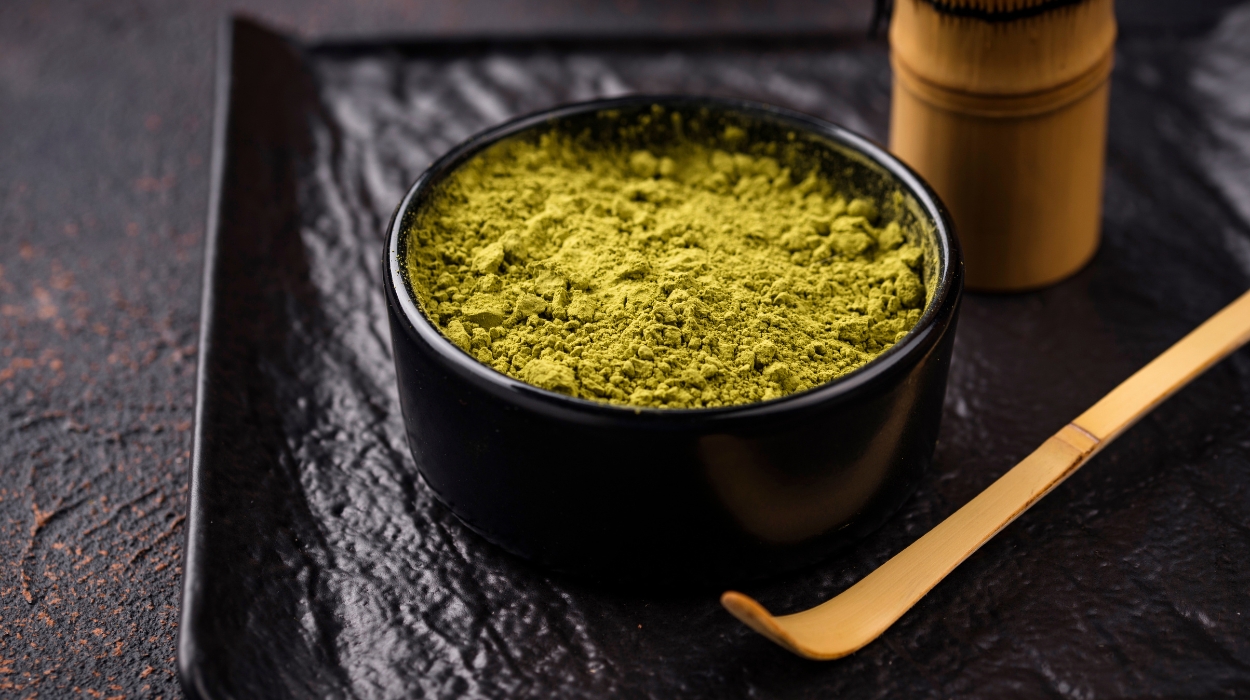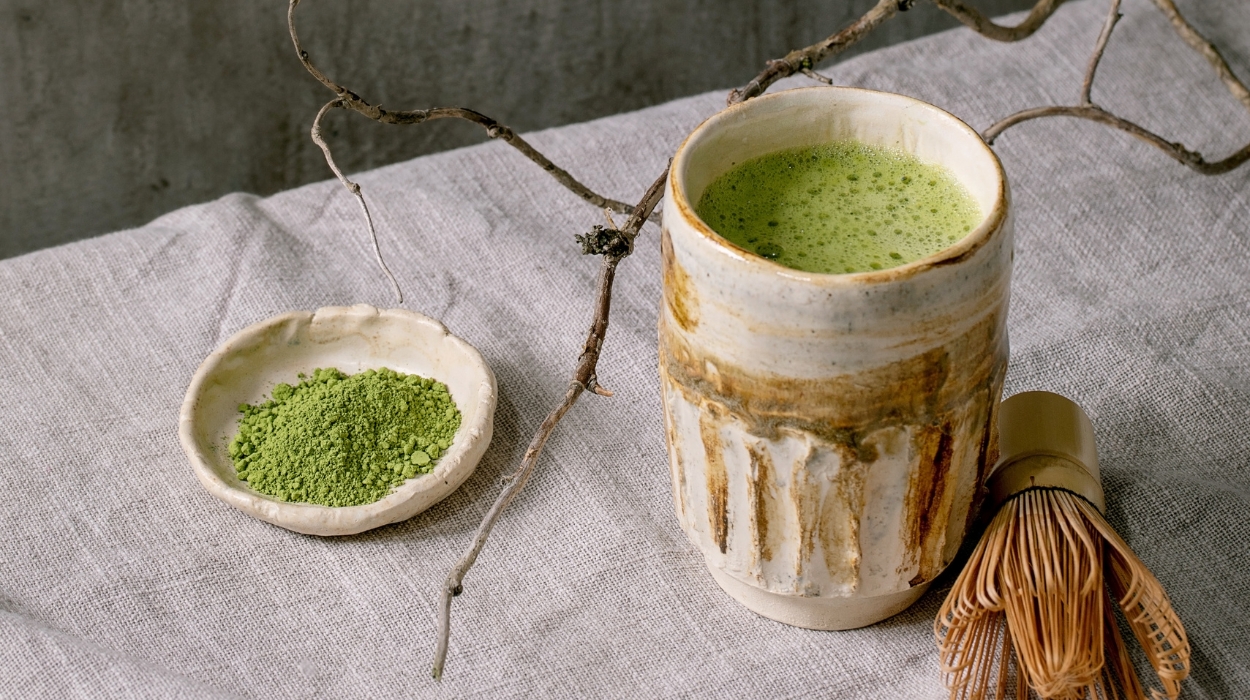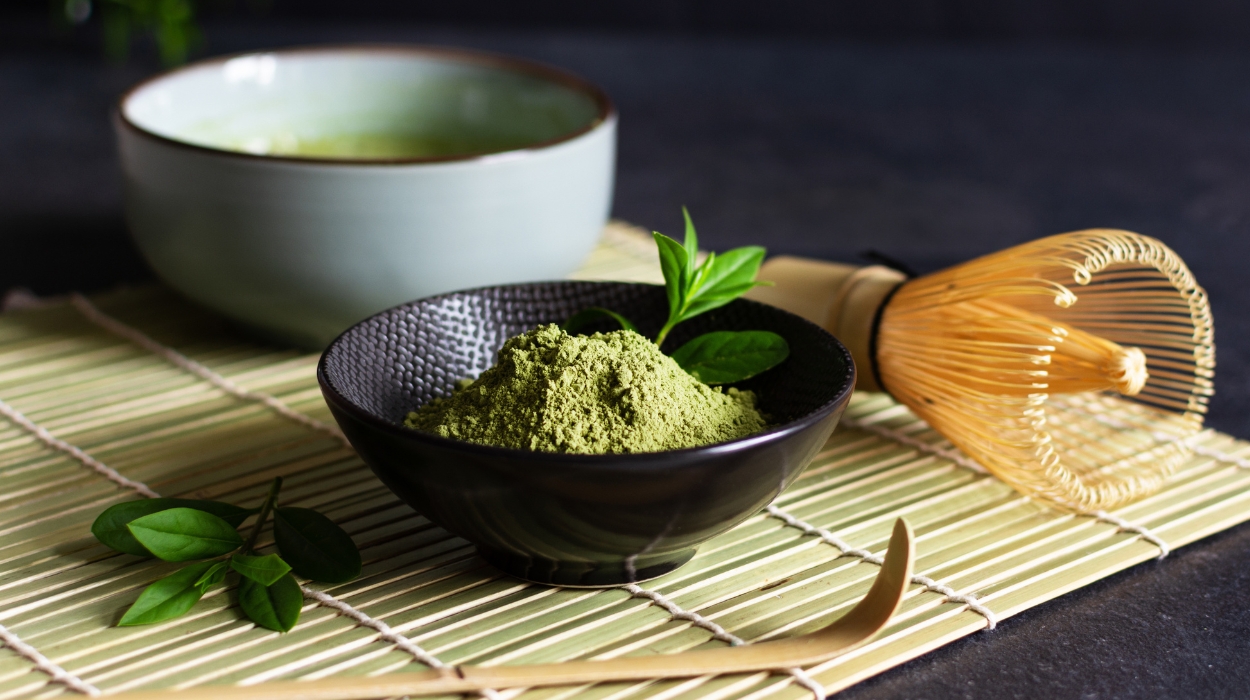With many fad diets on the market today, most people wonder whether the tools they’re losing to lose weight are effective. Matcha is a vibrant green elixir that’s quickly made its way to coffee shops and homes worldwide. But the question remains: Is matcha good for weight loss?
Let’s explore the potential weight loss benefits of matcha. We’ll discuss the health benefits of matcha and the optimal daily consumption for weight loss. Let’s dive into the world of matcha and unravel the truth about its wellness and weight management uses.
Is Matcha Good For Weight Loss?
Yes, matcha is good for weight loss due to its unique composition. Matcha is made from shade-grown green tea leaves, and it contains high levels of antioxidants, particularly catechins. Traditional matcha tea also contains metabolism-boosting compounds such as caffeine and epigallocatechin gallate.
Consuming matcha tea for weight loss offers the same health benefits as green tea. It also provides other health benefits, such as reduced inflammation, cancer prevention, and improved cognitive function.
Is Matcha Green Tea Good For Weight Loss?

There’s no quick fix for weight loss, but finding the right supplements and tools is the best way to reach your goals. Matcha goes beyond its vibrant color and earthy flavor and is among the best green powders with various weight loss benefits.
Here are some ways matcha powder helps those trying to lose weight:
Nutrient-Rich Drink
Matcha tea contains nutrients and vitamins supporting weight management and overall well-being. Concentrations of bioactive compounds are higher in matcha tea than in any other type of green tea because of their unique farming and harvesting process. It contains 60%-70% insoluble ingredients,[1] including vitamins, dietary fibers, chlorophylls, and proteins that support healthy weight loss.
Fat-Burning Effects
The nutrients in matcha offer weight loss properties that enhance your efforts and bring you closer to your weight loss goals. Green tea has been heavily studied for its weight loss effects, and it’s often found in many diet pills and weight loss supplements. Although many medical studies specifically focus on green tea, matcha is derived from the same plant and contains similar compounds.
Therefore, matcha powder has been shown to improve metabolism and burn fat. It offers a natural boost for weight loss, increasing energy levels and triggering fat metabolism. A study on matcha green tea drinks with exercise showed that matcha can enhance exercise-induced fat oxidation[2] during a 30-minute brisk walk.
Matcha tea also contains caffeine. The mild caffeine boost you get when drinking matcha can help promote alertness and improve physical performance. This further enhances calorie expenditure[3] and improves weight loss results.
High In Antioxidants
One of the most significant health benefits of green tea is the natural antioxidants it offers. The polyphenols found in matcha green tea act as powerful antioxidants offering similar benefits[4] to carotene, tocopherol, and vitamins E and C. Additionally, matcha tea is filled with catechins, antioxidants that help stabilize harmful free radicals.
Since free radicals can damage cells and cause several chronic diseases, an antioxidant-rich diet can improve overall health. Green tea contains four main catechins[4] essential to a healthy human diet. Epigallocatechin-3-gallate in matcha tea, or EGCG, is specifically linked to the prevention of many life-threatening chronic diseases, such as heart disease and colorectal cancer.
Although the catechin content is lower in matcha tea than regular green tea, it produces three times more antioxidants[5] when dissolved in water. Therefore, drinking matcha tea is an excellent way to increase your daily intake of antioxidants.
Health Benefits Of Matcha Tea

Anti-Inflammatory Effects
Many illnesses involve inflammation, which can produce harmful substances that lead to cell damage in the body. This damage can disrupt your body’s normal functioning and trigger more inflammation. The anti-inflammatory effects[4] in matcha green tea work by stopping the signals that cause inflammation.
Specifically, the EGCG found in green tea can control inflammatory conditions. It also reduces complications[4] after major heart surgery and prevents hepatitis by regulating inflammatory processes.
Improved Cardiovascular Health
Some studies suggest that drinking green tea can offer protection against heart disease. Green tea consumption is associated with a lower cardiovascular disease risk than coffee.[6] Since matcha green tea is similar in nutritional content to regular green tea, drinking matcha may also help improve cardiovascular health.
Matcha tea may also help decrease the likelihood of high blood pressure and other complications in individuals with heart disease. The EGCG in green tea may protect the heart muscle from damage by preventing inflammation and reducing oxidative stress.[7] Additionally, it may protect the heart muscle for surgery patients at risk of ischemic injury by inducing an inflammatory response.
Antiviral Properties
Green tea’s immune-modulating features and antiviral properties may help prevent and regulate the immune response[4] in infectious diseases like COVID-19. Matcha green tea might have antiviral activity against SARS-CoV-2, the virus causing COVID-19. While this study is promising, it is also limited, and further, more detailed research is needed.
While there are numerous studies on the antiviral properties of green tea, most focus on traditional green tea. Although matcha green tea has a unique composition and different bioactive compound ratios, its specific properties are often generalized to regular green tea. Therefore, matcha green tea offers the same positive health effects.
Cognitive Function Improvement
Drinking green tea is a helpful way to support clear thinking and cognitive function.[4] Factors like lifestyle and environment can affect cognitive function as we age. Regular caffeine consumption may lower the risk of cognitive decline in women, an effect that becomes more noticeable as we get older.
Caffeine works by reversing oxidative processes, reducing brain inflammation, and indirectly slowing brain aging. This helps to maintain normal brain function. Caffeine’s anti-inflammatory effects can prevent memory problems caused by oxidative stress.
Caffeine also has positive effects on the nervous system, preventing neurodegenerative diseases. EGCG in green tea is a potent neuroprotective agent. It can help protect against neurological disorders linked to inflammation and prevent nerve-related problems associated with neurodegenerative diseases like Alzheimer’s.
Cancer Prevention
Researchers worldwide have extensively studied how green tea can prevent cancer.[8] The anticancer effects of EGCG in matcha powder are thought to inhibit tumor blood vessel formation and suppress inflammatory processes that contribute to the development and progression of cancer. However, further studies and clinical trials are needed.
Lifestyle and diet play a significant role in the pathogenesis and progression of colorectal cancer. Visceral obesity from prolonged unhealthy choices increases the risk of gastrointestinal cancer. Consuming substantial amounts of EGCG may help lower the risk[4] of colorectal cancer by preventing tumor growth factors.
Additionally, EGCG can prevent the growth and induce the natural death of cancer cells. Research also shows that EGCG may prevent the development and progression[4] of gallbladder and bile duct cancer cells, decreasing the risk of biliary duct cancer.
What Is Matcha Green Tea?
Matcha tea is found in health stores and coffee shops and is offered as matcha shots, lattes, teas, protein powder additives, and even desserts. Similar to green tea, it comes from the Camellia sinensis plant.[4] However, it’s grown uniquely, giving matcha its distinct nutrient and flavor profile.
Tea plants grown explicitly for matcha green tea powder are shade-grown for several weeks. They are mainly grown in various regions of Japan. Matcha tea powder is made by milling young tea leaves into a vibrant green powder.
The finest young shade-grown leaves are hand-picked during a short harvesting season. This is what distinguishes matcha from other green tea extract products. After picking, the leaves are steamed to preserve color and flavor, giving matcha its sweet and grassy taste.
Steamed leaves are dried, de-stemmed, and stone-ground into superfine matcha powder using traditional Japanese stone mills. Unlike conventional tea, matcha green tea powder is combined directly with hot water, giving you the benefits of the entire tea leaf with each sip.
How Much Matcha Per Day For Weight Loss?
Drinking up to four cups[9] of green tea daily can lead to significant weight loss and reduced systolic blood pressure. Individual factors like caffeine tolerance and overall health can influence the suitable match for each person.
Always pay attention to your body’s signals and adapt your matcha tea intake based on your needs and reactions. Remember, matcha is most effective when added to a regular exercise regimen and a well-balanced diet focused on clean eating.
Conclusion
Incorporating matcha green tea into your daily routine can be a game-changer for losing weight. The combination of metabolism-boosting caffeine and fat-burning EGCG aids weight loss and provides a sustainable energy boost.
By adding matcha to your diet, you can take advantage of the powerful nutrients and antioxidants offered by the fine powder. Its unique cultivation and processing ensure maximum health benefits, promoting heart health, supporting cognitive function, and offering anti-inflammatory properties.
If you’re on a weight loss journey, consider making matcha an integral part of your daily routine. It’s not only an excellent choice for losing weight. It’s a helpful tool for those trying to prioritize their overall well-being.
Frequently Asked Questions
Yes, matcha tea can promote weight loss.[10] Consuming matcha can boost metabolism and promote fat burning, making it a beneficial addition to a balanced, healthy diet.
Matcha contains compounds that support weight loss, including that in the belly area. Although it doesn’t directly target belly fat, its unique properties aid weight loss. A cup of matcha daily is a valuable addition to a healthy lifestyle.
Yes, drinking a cup of matcha every day is generally okay. Incorporating a morning matcha into your routine offers a boost of antioxidants and energy. However, individual tolerance may vary, so listen to your body’s response.
The best time to drink matcha for weight loss is in the morning. Preparing matcha as part of your morning routine can boost metabolism and aid in weight loss. Kickstart a healthy day with a delicious cup of matcha.
You can enjoy matcha lattes while sticking to your weight loss regimen. However, it’s essential to ensure you customize your order. Many latte recipes include fattening dairy products and added sugars, so you must be cautious.
Both matcha and green tea aid weight loss. Matcha has concentrated antioxidants that promote a healthy metabolism. Green tea offers thermogenic benefits that help you burn calories. Your individual health goals and personal preferences ultimately determine the better choice.
 Evidence Based
Evidence Based
